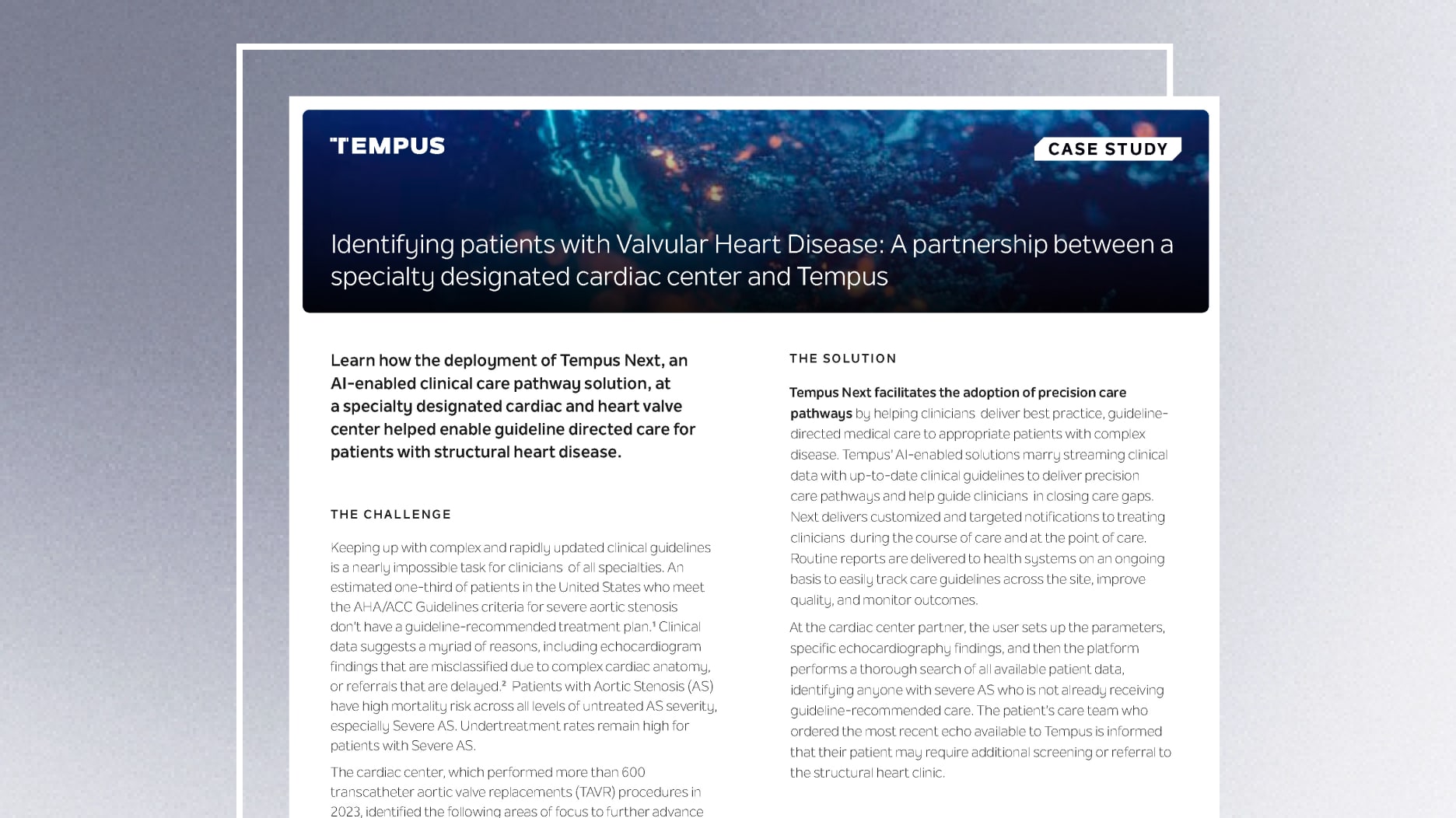-
PROVIDERS
Read more
Browse our latest selection of abstracts, manuscripts, and presentations.
- LIFE SCIENCES
-
PATIENTS
It's About Time
View the Tempus vision.
- RESOURCES
-
ABOUT US
View Job Postings
We’re looking for people who can change the world.

PROVIDERS /// CARDIOLOGY
AI-enabled solutions to help identify and treat cardiovascular disease
We build solutions that leverage routinely generated clinical data to help clinicians find patients with undiagnosed or undertreated cardiovascular disease.
OUR SOLUTION
Tempus Next
Tempus Next is an AI-platform that enables healthcare systems to add an “intelligent layer” onto routinely generated data to help find appropriate patients for proactive care and disease management. Tempus Next ingests multimodal data, runs AI-based algorithms, and surfaces insights for care teams to evaluate and action.
Our impact
-
60+
algorithms to identify potential care gaps across 18 cardiovascular diseases
-
1.5M+
patients screened
-
80+
hospitals nationwide are currently powered by Tempus Next
-
44K+
patients screened per month

How it works
Identify and minimize care gaps with Tempus Next.1 With our AI-platform, you’ll experience:
Easy EHR integration
Seamlessly and securely integrates into your hospital’s EHR system to monitor cardiac patients for optimal treatment
Advanced Natural Language Processing (NLP)
Analyzes free text from clinical notes and other data sources using Advanced NLP
A true partner in excellence
Provides team support to ensure you exceed your objectives for superior care
Robust cardiac service line coverage
Encompasses a broad cardiac service line, helping care teams enable comprehensive cardiac disease care
-
Aorta
Tempus Next includes screening algorithms for abdominal aortic aneurysms (AAA) and thoracic aortic aneurysms (TAA) using clinician reports from abdominal ultrasounds and CTs, in addition to all other available patient data. Our system follows patients through progression from low severity to high severity.
-
Structural Heart
Our Structural Heart capabilities include screening for appropriate care across aortic stenosis, aortic regurgitation, mitral stenosis, mitral regurgitation, tricuspid regurgitation, and pulmonary regurgitation.
-
Cardiomyopathies
Within cardiomyopathies, our screening protocols address care across non-ischemic dilated cardiomyopathy, hypertrophic cardiomyopathy, cardiac amyloidosis, pulmonary hypertension, and cardiac oncologic disease. Our mission is to shorten the time to referral for consideration of advanced heart failure treatment options like LVAD or heart transplants. We also aim to enable clinicians to track patient adherence to prescribed diagnostic studies and follow-up visits with cardiologists.
-
Electrophysiology
Our electrophysiology capabilities include screening for risk of sudden cardiac arrest (SCA), risk of left atrial appendage thrombus, and atrial fibrillation. SCA causes over 300,000 deaths annually in the United States; however, prevention is challenging due to difficulty identifying at-risk patients.2 Less than 10% of patients who meet the AHA/ACC/HRS guidelines criteria for a primary prevention implantable cardioverter-defibrillator (ICD) receive a device, with women more likely to be undertreated.2 Tempus Next continuously monitors patient data to find at-risk patients, and alert the patient’s care team of any needed follow-up or disease progression.
-
Guideline-Directed Medical Therapy
Tempus Next also screens for an array of additional conditions including congestive heart failure, acute coronary syndrome, ischemic heart diseases, hypertension, and dyslipidemia. Our program monitors length of time and patient adherence to Guideline Directed Medical Therapy, as well as key markers including ejection fraction during this period to determine the potential need for referral to a heart clinic. Studies have shown that patients not optimized on Guideline Directed Medical Therapy are 26% more likely to have higher annualized healthcare utilization and emergency department visits.3
Tempus Next includes screening algorithms for abdominal aortic aneurysms (AAA) and thoracic aortic aneurysms (TAA) using clinician reports from abdominal ultrasounds and CTs, in addition to all other available patient data. Our system follows patients through progression from low severity to high severity.
Our Structural Heart capabilities include screening for appropriate care across aortic stenosis, aortic regurgitation, mitral stenosis, mitral regurgitation, tricuspid regurgitation, and pulmonary regurgitation.
Within cardiomyopathies, our screening protocols address care across non-ischemic dilated cardiomyopathy, hypertrophic cardiomyopathy, cardiac amyloidosis, pulmonary hypertension, and cardiac oncologic disease. Our mission is to shorten the time to referral for consideration of advanced heart failure treatment options like LVAD or heart transplants. We also aim to enable clinicians to track patient adherence to prescribed diagnostic studies and follow-up visits with cardiologists.
Our electrophysiology capabilities include screening for risk of sudden cardiac arrest (SCA), risk of left atrial appendage thrombus, and atrial fibrillation. SCA causes over 300,000 deaths annually in the United States; however, prevention is challenging due to difficulty identifying at-risk patients.2 Less than 10% of patients who meet the AHA/ACC/HRS guidelines criteria for a primary prevention implantable cardioverter-defibrillator (ICD) receive a device, with women more likely to be undertreated.2 Tempus Next continuously monitors patient data to find at-risk patients, and alert the patient’s care team of any needed follow-up or disease progression.
Tempus Next also screens for an array of additional conditions including congestive heart failure, acute coronary syndrome, ischemic heart diseases, hypertension, and dyslipidemia. Our program monitors length of time and patient adherence to Guideline Directed Medical Therapy, as well as key markers including ejection fraction during this period to determine the potential need for referral to a heart clinic. Studies have shown that patients not optimized on Guideline Directed Medical Therapy are 26% more likely to have higher annualized healthcare utilization and emergency department visits.3
Case Study
Identifying patients with Valvular Heart Disease: A partnership between a specialty designated cardiac center and TempusLearn how the deployment of Tempus Next, an AI-enabled clinical care pathway solution, at a specialty designated cardiac and heart valve center helped enable guideline directed care for patients with structural heart disease.
LEARN MORE
-
UPCOMING WEBINAR:
Large Language Models with Retrieval-Augmented Generation for Zero-Shot Disease Phenotyping
This paper proposes a zero-shot LLM-based method which pre-identifies disease-related text snippets to be used in parallel as queries for the LLM to establish diagnosis. We show that this method as applied to pulmonary hypertension (PH) significantly outperforms physician logic rules and has the potential to enhance rare disease cohort identification, expanding the scope of robust clinical research and care gap identification.
Read more -
UPCOMING WEBINAR:
Deep neural networks can predict new-onset Atrial Fibrillation from the 12-lead ECG and help identify those at risk of Atrial Fibrillation-related stroke
Atrial fibrillation (AF) is associated with substantial morbidity, especially when it goes undetected. If new-onset AF can be predicted, targeted screening could possibly be used to find it early. In this study, we explore if a deep neural network can predict new-onset AF from the resting 12-lead ECG and study whether this prediction may help identify those at risk of AF-related stroke.
Read more -
UPCOMING WEBINAR:
rECHOmmend: An ECG-based machine learning approach for identifying patients at increased risk of undiagnosed structural heart disease detectable by Echocardiography
In this study, we developed a novel ECG-based machine learning approach to predict multiple structural heart conditions, hypothesizing that a composite model would yield higher prevalence and positive predictive values to facilitate meaningful recommendations for echocardiography.
Read more -
UPCOMING WEBINAR:
Prospective evidence generation via ECG-AID Study
We have launched a multi-site prospective study with our beta partners to test our algorithms for atrial fibrillation and structural heart disease. The study is called ‘ECG-AID’ and is expected to enroll 600-1,000 patients to validate prospective performance across multiple patient populations and data systems.
Read more -
UPCOMING WEBINAR:
Machine learning analysis including social determinants of health for prediction of mortality following Transcatheter Aortic Valve Implantation: a single center experience
Social Determinants of Health are increasingly being recognized as critical, independent prognosticators in cardiovascular disease. In this study, we explore if our ML model provides a holistic picture of mortality prediction to understand the role in care following TAVI.
Read more -
UPCOMING WEBINAR:
Racial and Echocardiographic predictors of all-cause mortality in patients with moderate Tricuspid Regurgitation: a single center study
This study assessed transthoracic echocardiography (TTE), clinical and socioeconomic (SES) factors as predictors of progression from moderate to severe tricuspid regurgitation (TR) and showed that race/TTE indices offer insights into personalized management of patients with moderate TR.
Read more -
UPCOMING WEBINAR:
Enhanced detection of Heart Valve Disease using integrated artificial intelligence at scale
This study explores our platform that uses a rules-based algorithm to search EHRs for heart valve disease among patients treated by healthcare systems in the US to help provide a solution.
Read more -
UPCOMING WEBINAR:
ML-based cluster analysis of patients with significant TR reveals distinct population with different phenotypes and clinical outcomes
In this Alan S. Pearlman Research Award Winning analysis, we uncover that significant TR is associated with considerable risk of clinical outcomes, and that a ML-based approach to identify phenogroups may aid in the timing and selection of therapy.
Read more -
UPCOMING WEBINAR:
Machine learning analysis of progression from moderate to severe Tricuspid Regurgitation
This study assessed echocardiographic (Echo) and demographic predictors of moderate TR progression using Natural Language Processing (NLP) to further support that insights from NLP can help to improve the performance of disease prediction.
Read more
- Daniel P. O’Hair, MD; Hemal Gada, MD; Miguel R. Sotelo, PHD; Loren Wagner, MA; Cara M. Fiend, BS; Logan Brigman, BS; Chris Rogers, BS; Navjot S. Kohli, MD. June 14, 2021. Enhanced Detection of Heart Valve Disease Using Integrated Artificial Intelligence at Scale [online]. Available from: https://www.annalsthoracicsurgery.org/article/S0003-4975(21)01032-8/pdf [Accessed May 1, 2023]
- Husband G.; D”amico A.; Hasnie U.; Batra N.; Cochrun S.; Gann A.; Li E.; Nguyen D.; Philip George A.; Soto M.; Rogers C.; Ahmed M.; Andrikopoulou E.; UAB Hospital, Birmingham, United States of America; University of South Alabama, Mobile, United States of America; The Johns Hopkins Hospital, Baltimore, United States of America. February 2022. European Heart Journal – Cardiovascular Imaging, Volume 23, Issue Supplement_1 [online]. Available from: https://academic.oup.com/ehjcimaging/article/23/Supplement_1/jeab289.244/6522478
- Sudden Cardiac Arrest Foundation. January 29, 2020. Latest statistics: 1,000 people suffer sudden cardiac arrest each day in U.S.; only 10% survive [online]. Available from: https://www.sca-aware.org/sca-news/latest-statistics-1000-people-suffer-sudden-cardiac-arrest-each-day-in-us-only-10-survive [Accessed May 1, 2023]
- J Comp Eff Res. October 2021. Healthcare utilization and guideline-directed medical therapy in heart failure patients with reduced ejection fraction [online]. Available from: https://pubmed.ncbi.nlm.nih.gov/34225473/ [Accessed May 1, 2023]
Partnering with Tempus is investing in the future
We believe that AI-enabled solutions can help shorten the diagnostic odyssey and improve the lives and outcomes of patients with cardiovascular disease.